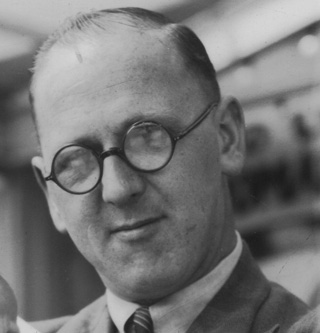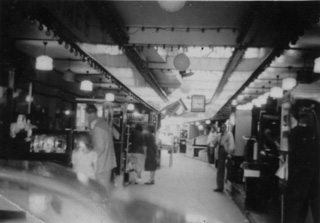|
|
||
|
Harry Brown and
Pleasureland Whilst Sid Brown was effectively running Joyland through the 1950s, so Harry Brown was running Pleasureland. Just as Sid would stand in the centre of Joyland watching over his mother’s empire, so Harry had his own way of keeping an eye on Joyland’s smaller sister. He would stand in the arcade with his little pendant clock watching punters come and go, the times people entered and left, and most importantly, which customers appeared to be putting large sums of money into machines. He was forced to do this because, if he didn’t, his staff would take advantage of the situation and money would disappear from the machines. As a mechanism of self-protection, Harry was always very careful about taking on casual staff every year. If a member of staff had been taken on for three consecutive seasons, he would generally not take them on for a fourth. To someone who is not involved in the amusement industry that could seem at odds with what happens elsewhere. After all, if casual staff worked in the arcade for three seasons, one may be expected to think that they would learn the business, and particularly the workings of the machines, which would benefit the operation of the arcade. But this approach was learnt from bitter experience. Harry’s Assistant Manager at Pleasureland, Dennis Tate, explains that there was method to his madness: “At the start of the season, Harry would say: ‘So and so is rooting for a job, but I don’t think I am going to have him. He has been here three seasons; he will know too much now. He will get to know too many ins and outs. No, I won’t have him, I’ll get a fresh one.’” His concern was that, despite the fact that an experienced casual might know more about the workings of the machines, they would also learn the art of maximising their own personal takings. For this reason Harry and Sid would put the permanent staff on the attractions where these scams could most easily be employed. Dennis Tate explains this further. “The summer staff would get to know all the little tricks of the trade. They would get the money off the customer, maybe collect two punters’ money, walk along, drop one, and only put one back in the kitty box. Then later on, when no one is around, they would bend down and pick the dropped coin up off the floor. That went in their pocket.” In 1954, Dennis Tate received an offer of better employment. At Pleasureland, he received only five or six pounds per week; in his new job he would make eight. This worked out at approximately a halfpenny an hour. But he enjoyed working at Pleasureland and Joyland, and hoped that a little negotiation might allow him to stay there with an increased wage packet. He approached Harry and asked him if he would increase his wages to match the offer he had just received. Harry said he would get an increase, as he was going to increase the wages anyway for collecting nights. The days passed, and no increase was forthcoming. Dennis thought that perhaps it would be on a monthly basis, so he approached him again. Harry said, “You are on the permanent staff, aren’t you” Dennis said “yes”. He said, “It is only the casual staff that get the extra money.” Dennis decided to make a final approach to Harry. After all, the job offer would not last forever. Dennis asked for written confirmation that his wages would be increased to eight pounds per week. Harry said he would go and write him a statement out. Dennis was relieved that Harry had agreed to put it in writing. With a written statement, on Pleasureland headed paper, he would have all the certainty he needed to be able to turn down the job offer. Dennis continues the story: “So, Harry came back with a torn off flap of a used envelope, stating ‘EW (Easter Week), WW (Whit Week), AW (August Week): £8, £8, £8.’ There was no heading, there was no date, there was no signature, nothing. He said, ‘Here you are.” I said, ‘If that’s all I am getting, goodbye!’ And I walked out.” That was an example of the casual way in which amusement arcades worked at that time. This would all change in the future, but during the 1950s, this was the norm for unskilled staff. But Harry also had a generous side for those outside the amusement business. Ian Dixon, who has run the fish and chip shop on Cliff Street opposite Pleasureland since the 1950s, remembers: “He would keep all the half crowns and two shilling pieces, any coins which had been inadvertently put into the penny machine. Then, at the end of the summer, he would take them to the Sailor’s Club and stick them on the bar and it was free drinks for all the members!” |
 Harry Brown in Pleasureland, 1939. Photograph: Peter and Linda Brown
|
|
|
|
||
|
Published by: |
For further
information contact: |
|

